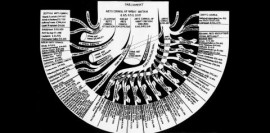
Blogger profile: Beth Webster
We catch up with Beth Webster, in her final year of her Fine Art degree at Lincoln University, and talk about the concept of beauty, histories of found-objects in art and the ‘spin’ of self in one’s practice.
We catch up with Beth Webster, in her final year of her Fine Art degree at Lincoln University, and talk about the concept of beauty, histories of found-objects in art and the ‘spin’ of self in one’s practice.
Access to professional development is vital to artists’ careers, so here’s something we think will help.
Townley and Bradby have an ongoing collaborative practice. They also have two children. Here they discuss how they used an investigative project to allow their art practice and their parental commitments to inform one another, rather than remaining distinct entities. However, this feature does not look at the existing collaboration between the duo, it looks at the working relationship they initiated with a psychologist who specialises in families.
Zanne Andrea completed her Fine Art degree at University of the West of England (UWE) in Bristol, in the summer of 2011. We catch up with her en route to a collaborative empty-shops project and off the back of a mini-residency, six months on from graduating.
OpenAIR, the first annual members’forum of AIR: Artists Interaction and Representation, offers a unique platform for artists’ dialogue and debate, empowered and enabled through speakers drawn from very different disciplines and fields of work, all committed to campaigning for effective change.
Cara Courage examines the evidence about the gender imbalance in the arts workforce and asks whether it’s really down to women wanting to ‘have it all’.
After his show for New Work Scotland Programme at Collective Gallery, Edinburgh and before his solo show at Liverpool’s Royal Standard, Oliver Braid shares some thoughts on his career as an artist so far, including ideas on how to make a self-made residency and how to organise your own ‘graduate diary’.
Becky Hunter is a freelance art writer whose blogs demistify, with honesty and intelligence, the processes of making art, writing about art, and finding a place in the wider world of art. Here she talks to Andrew Bryant about criticality and affect, the prickly subject of money, and why we need idealists.
In her final year at University College Falmouth, Suzy Waldron tells us about perspective in her work and balancing visual-practice with her written dissertation.
The continued economic doldrums and uncertainty in public funding make it more important than ever for artists to find ways to make and save money. So here are some tips – old and new – from the a-n community.
Artist, educator and AIR Council member Rosalind Davis reports on some recent events for and about artists and contexts for practice.
A survey of commissioning projects and public art consultancies around the UK.
Ruth Ben-Tovim and Anne-Marie Culhane discuss two collaborative projects that focus on exchange, community and participation.
We’ve an opinion-rich issue for December/January – see packed letters page and extended Debate section for evidence of artists taking a stand.
Joshua Sofaer asks what can culture do in times of wider crises.
Three years after graduating from Glasgow School of Art photographer Elizabeth Wewiora discusses her career path so far and takes us along for the ride.
Andrew Bryant discusses a new series of events that take Artists talking ‘out of the virtual and into the actual’.
If there is any single shared idea about art, it’s that it can be transformative. Aliceson Carter came to art late, and her ‘story’ and her work, bear out the deconstructive and reconstructive potential of creativity. Here she talks to Andrew Bryant about Goldsmiths, blogging and being on the outside.
Over the past five years, the words Turning Point have been read, heard, written and spoken with increasing frequency by people in the visual arts in England, but for many individual arts practitioners, in particular, the origins and activities of Turning Point remain a bit opaque. This briefing paper is for them and for anyone interested in understanding more about what Turning Point is and does.
The key finding of this study reveals that shockingly few individual artists apply for funding in their own right, and even fewer are successful. What this means is that there is little direct funding being given to artists to pursue and develop their own projects, under their own control – under 20% of available funding for the visual arts in England, 14% for Northern Ireland and around 18% for Scotland and Wales in 2009-2010.
Is there enough funding going to individual artists and are the application processes user-friendly? These were questions a-n set out to answer in the fourth issue of what was then Artists Newsletter in 1980. Now, thirty one years later, we asked Dany Louise to do this research again, examining the current state of play for grants to individual artists as offered by Arts Council England, Arts Council of Northern Ireland, Arts Council of Wales and Creative Scotland – including comparators of volumes of artists applying and success rates – and to ascertain whether a “fair share” has been getting into the hands of artists to develop their practice.
The Project Arts Centre, Dublin
8 July – 20 August
There are two key things Nicholas Leverington mentions that I want to zone into.
Alex Murdin asks what is Localism and what effect it is likely to have on art practice in regional areas.
A selection of projects, residencies and exhibitions taking place outside the big cities this autumn.


















